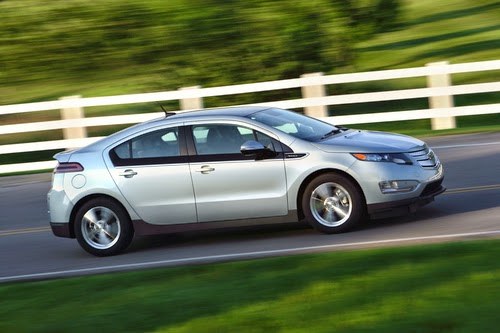Confidence abounds that they can fix the problems, and getting back to production and sales.
With
the controversy brewing about battery pack safety in the Volt, the
folks who are stirring the controversy might believe that GM would stop
producing the Volt. Instead in a recent interview GM’s CEO Dan Akerson
says the automaker plans to do the exact opposite, that they’ll
considerably ramp up Volt production after first addressing the issue
behind the battery fire.
It would be sad if this were a case of folly, where the Volt was
actually dangerous and GM was bravely soldiering on anyway but selling
us dangerous cars. Instead the situation GM faces is one in which the
facts say the car is safe, with a flaw the engineers are working to
address, and a customer base who is rallying around the Volt.
In an interview published on Sunday in the Detroit Free Press,
Akerson called the Volt “safe,” pointing out the fires observed so far
have occurred only in testing, many days after simulated crashes. He
went on to say it’s in the best interest of all that “it’s better to get
it right now,” that is fix the issue now, rather than “when you have
6,000 — instead of 60,000 or 600,000 — cars on the road.” The cost
will be lower now to fix the issue (e.g. via a recall) with relatively
small number of Volt’s on the road (6000 or so have been sold) rather
than fixing it in a year or two when there are tens or hundreds of
thousands of Volt’s on the road.
Talking about the three fires observed so far Akerson said “We’re not
the only car company that has liquid-cooled batteries out there.”
Those fires, which were observed only in NHTSA simulated crashes, are
thought to have occurred because of coolant leakage in damaged battery
packs. Some EV automakers (notably Coda, Ford and GM) have active
cooling systems that are meant to keep batteries within reasonable
operating temperatures, because batteries can get hot during charging
and during use. Nissan relies on passive cooling, that is air flow,
rather than active cooling with a liquid coolant. Ford’s
representatives say “We still have limited information about the cause
of the Volt fires in the government crash tests, so it is difficult to
comment on how they relate to Ford’s electrification program,” and that
they will continue “to work with the NHTSA as we prepare to launch our
electrified vehicles over the next year.”
If GM is able to increase Volt production to 60,000 in
2012 it will be a faster ramp-up rate than the Toyota Prius, which did
not really take off until the Gen II Prius was launched. Would the
adoption of EV’s be faster, or slower, than the adoption of hybrid cars a
decade ago?
Whether GM is foolish, or wise, to increase Volt production depends on how the concern over the fires plays out.
Is the Volt safe? Depends on who you ask, according to Frank
Beckmann in an editorial published last week in the Detroit News. That
article laid out a sound case that the controversy is over-hyped, and
would everyone please stop hyper-ventilating? Namely that the
investigation is still underway, the cause hasn’t been determined for
certain, it might not even be due to leaking coolant, the fires occurred
only following “extreme NHTSA tests,” the fires took several days to
ignite, and that perhaps the scenario is impossible to replicate in
real-world driving.
And what of the Volt owners? If this were an unsafe car wouldn’t
they be up in arms against GM? Instead they’re generally rallying
around the Volt, as evidenced by the open letter published a couple
weeks ago (Chevy Volt owners to GM: We’re Keeping our Cars & Keys).
GM’s automotive engineers are some of the best in the world, and
the NHTSA is one of the best safety agencies in the world. The
automakers and the NHTSA routinely handle safety defects in automobiles
and trucks, conducting recalls when necessary. We have over 200,000 car
fires a year with very little controversy. It seems reasonable on GM’s
part to expect that this issue will be resolved shortly, they’ll run
through some process like a recall to fix whatever cause is identified,
and that it’s a reasonable move to proceed with ramping up Volt
production.
Originally published at TorqueNews: http://www.torquenews.com/1075/gms-ceo-akerson-wants-build-60000-volts-2012![]()
- Highway design could decrease death and injury risk, if “we” chose smarter designs - March 28, 2015
- GM really did trademark “range anxiety”, only later to abandon that mark - March 25, 2015
- US Government releases new regulations on hydraulic fracturing, that some call “toothless” - March 20, 2015
- Tesla Motors magic pill to solve range anxiety doesn’t quite instill range confidence - March 19, 2015
- Update on Galena IL oil train – 21 cars involved, which were the supposedly safer CP1232 design - March 7, 2015
- Another oil bomb train – why are they shipping crude oil by train? – Symptoms of fossil fuel addiction - March 6, 2015
- Chevron relinquishes fracking in Romania, as part of broader pull-out from Eastern European fracking operations - February 22, 2015
- Answer anti- electric car articles with truth and pride – truth outshines all distortions - February 19, 2015
- Apple taking big risk on developing a car? Please, Apple, don’t go there! - February 16, 2015
- Toyota, Nissan, Honda working on Japanese fuel cell infrastructure for Japanese government - February 12, 2015












